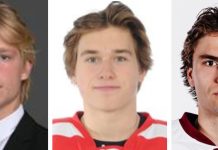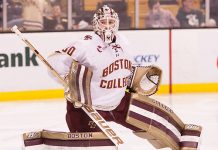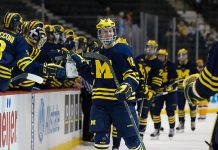Yes, folks, it’s back. It’s finally back.
The Hobey Watch Blog is back for the run up to the presentation of the 2013 Hobey Baker Award.

Why, what did you think I was talking about?
In all seriousness, with the Hobey Baker “nominees” being announced this week and voting now open at HobeyBakerAward.com, it’s a perfect time to gear up USCHO’s weekly look at the race for college hockey’s top individual honor. It’s certainly been an interesting first half, and the competition should only intensify as teams make the push toward conference championships and the NCAA tournament. Of course, it’s team success that they’re really pushing toward, but it’s times like these when top players tend to shine brightest.
Of course, one player in the Hobey race has shone particularly bright of late, albeit not on college ice. That would be John Gaudreau of Boston College, who took a star turn as the U.S. won gold at the World Junior Championship last weekend.
Ideally, we should point out, games at the World Juniors shouldn’t have any bearing on the Hobey race since it’s a college hockey award, and in reality, if Gaudreau were having a ho-hum season at the Heights nothing he did in Ufa would give any more weight to his Hobey candidacy.
However, with 23 points (11 goals, 12 assists) in 14 games this season, Gaudreau has certainly delivered the goods for the Eagles, and put himself in line to join the likes of Cam Atkinson, Nathan Gerbe, Chris Collins and Brian Gionta as Eagles forwards to advance to the Hobey Hat Trick (along with other BC forwards, like Ben and Patrick Eaves, who have been finalists).
This, naturally, is where those of you who are regular readers of the Hobey Watch will be expecting me to return to the question of whether the Hobey voters will ever recognize a small BC forward with the college game’s top individual honor, and I won’t disappoint. It is worth noting that ever since Jerry York returned to his alma mater as head coach, the one Eagles player to win the Hobey was Mike Mottau, a defenseman. As often as a small Eagles forward has been recognized among the top 10 (and even the top three), none has ever captured the big prize (although Gerbe, Atkinson, Gionta and Gaudreau can claim something more significant: an NCAA title).
In the past, I’ve compared it to a similar issue concerning goaltenders from Cornell, like David LeNeveu, David McKee and Ben Scrivens, who have put up outstanding numbers but not won the Hobey, and wondered if BC forwards and Cornell goalies are penalized for playing in a system that has allowed so many of their fellows to succeed.
I picked up some wisdom on that subject from none other than Joe Montana in the Dec. 24 issue of Sports Illustrated, in a “Guest Shot” on Dan Patrick’s “Just My Type” column. Montana told Patrick that he’d heard criticism that he was just a “system quarterback” with the San Francisco 49ers, because of the success that Steve Young had immediately after Montana left to finish his career with the Chiefs. Did the criticism bother Montana?
“No,” Montana told Patrick, “because I have those ‘system’ rings.”
In truth, I doubt you’d ever hear Gionta, Gerbe, Atkinson or any other “overlooked” BC forward grouse about not having won the Hobey, since they got something much more valuable to any player worth his salt. That having been said, this is a Hobey blog, and this question about whether the voters give small BC forwards their due will persist until a BC forward actually wins the thing.
That brings us back to Gaudreau and his recent exploits at the World Juniors. As we’ve established, they’re not college games, and in fairness, they shouldn’t count toward Gaudreau’s case for the Hobey. In reality, though, I’m not so sure.
Part of the reason that we as college hockey fans care so much about the World Juniors — beyond the fact that so many NCAA players represent to the U.S., of course — is that to some extent, the tournament represents a referendum of sorts on the competing development systems offered through college hockey and the CHL. When the Americans win, it’s seen as a victory for college hockey, even if a number of major junior players played major roles in the victory (Seth Jones, J.T. Miller and John Gibson come to mind).
So Gaudreau didn’t just contribute to a win for the U.S. in Russia but to a win for the American/NCAA development model (as many pointed out in the wake of Don Cherry’s post-semifinals Twitter rant, all five goals scored in the semifinal against Canada were scored by NCAA players).
More than that, though, Gaudreau stepped up big at a moment when the eyes of the hockey world were on him, and that never hurts one’s Hobey candidacy. As much as a Hobey voter may try to consciously discount Gaudreau’s WJC performance when voting in March, the impression that he made could be difficult to get rid of. It’s an opportunity that most of Gaudreau’s competitors for the award — North Dakota’s Corban Knight and Nebraska-Omaha’s Ryan Walters, for example — don’t have, and that may not be fair. But that’s how it is.
It’s a little like the Beanpot in that respect. Should whatever Gaudreau does next month at TD Garden count toward his Hobey candidacy any more than what Corban Knight may do in one game against Wisconsin two nights earlier? Probably not. However, the Beanpot offers a big stage with the entire college hockey world watching, and if Gaudreau should step up, then it’s hard to say that it won’t leave an impression.
Of course, there’s quite a bit of hockey yet to be played, and there are certainly a number of other players having noteworthy seasons, so it’s not like Gaudreau has anything locked up (someone may even point out that he’s not even the nation’s leading scorer right now). However, he’s certainly made a lot of noise lately, and it’s hard not to hear it, even if the sound was coming all the way from Russia.


